Why Do I Wake Up So Much at Night? Reasons and Remedies

If you’re struggling to stay asleep throughout the night on a regular basis, you’re not alone. According to the American Sleep Association, up to 70 million adults in the United States have sleep disorders.
Why do you wake up so much at night? Well, there’s no clear-cut answer that will instantly solve this problem. Below, we’ll take a closer look at some of the common reasons for insomnia and restlessness, then explore potential remedies to help you get the shuteye you deserve.
Causes for Waking Up in the Middle of the Night
You might not think those constant nights of waking up at 2:00 AM, then 3:00 AM, and again at 4:00 AM are that big of a deal – but it can lead to worse consequences than just sleepiness.
Harvard Medical School notes that insufficient sleep can lead to a number of chronic health problems, such as obesity, heart disease, diabetes, and high blood pressure. If you’re sleep-deprived, you’re also at risk for “microsleep,” or brief 5-15 second bouts of sleep, that can put you in serious danger, especially when driving.
To ensure you’re getting enough sleep to avoid negative health consequences like these, take a look at these causes of waking up in the middle of the night below.
1. Sleep Apnea
We’ve all had those moments where we snore for a brief second and jolt awake. But when snoring becomes a recurring problem, you may be suffering from a sleep disorder called sleep apnea. Sleep apnea is a condition where a sleeper’s airway becomes blocked repeatedly during the night, which can reduce or completely stop airflow.
If you’re wondering whether you may have sleep apnea or not, some signs and symptoms include: gasping for air during sleep, loud and frequent snoring, extreme daytime fatigue, dry mouth when waking up, headaches when waking up, and decreased motor skills, memory, attention, and concentration.
Causes of sleep apnea include:
- Large tonsils
- Premature birth
- Obesity
- Heart or kidney failure
- Genetic syndromes
- Neuromuscular conditions
- Endocrine disorders
Remedies for Sleep Apnea
If you’re constantly waking up in the middle of the night due to sleep apnea, don’t fret. Sleep apnea is one of the most common sleep disorders in the U.S., but you’ll need to contact a physician specializing in sleep to be diagnosed. The American Sleep Apnea Association recommends numerous treatments and remedies, including:
- Breathing Devices and Mouthpieces: Breathing devices and mouthpieces are typically the first line of defense when it comes to controlling sleep apnea. A common breathing device is a CPAP machine, which increases the air pressure in your throat to prevent your airway from collapsing. You can also wear mouthpieces including tongue retaining devices and mandibular repositioning mouthpieces which help keep your airway open and unobstructed.
- Weight Loss: With roughly 70 percent of sleep apnea patients overweight or obese, weight loss can be a potential remedy to combat waking up in the middle of the night from sleep apnea.
- Surgery: If you have large tonsils or other physical obstructions to the upper airway, surgery might be necessary. Some potential surgeries include a tonsillectomy, the removal of your tonsils, a maxillary advancement, the repositioning of your lower and upper jaw, or a tracheostomy, a surgery to make a hole in your windpipe.
- Nasal Decongestants: Sometimes, the reason you may be suffering from sleep apnea can be something as simple as a congested nose. Nasal decongestants can help remove mucus, reduce inflammation, and open your airway.
- Airway Therapy: There are numerous airway therapies you may want to consider if you’re suffering from sleep apnea, including Positive Airway Pressure Therapy, Expiratory Positive Airway Therapy, and Oral Pressure Therapy.
2. Frequent Urination

Waking up in the middle of the night needing to sprint to the bathroom? You may have nocturia. Nocturia, according to the National Association for Continence, is when the body overproduces urine at night, interrupting your sleep cycle. A night bathroom break every once in a while isn’t uncommon, but if it’s a recurring issue, nocturia might be to blame. You might be surprised to learn that one in three adults over 30 wakes up more than once to use the bathroom at night, although it is typically more common in older adults, especially over 60.
Some causes of nocturia include:
- Drinking water right before bed
- Pregnancy
- Drinking alcohol, coffee, or other caffeinated beverages before bed
- Enlarged prostate gland
- Urinary tract infection
- Bladder infection
Remedies for Frequent Urination
There are numerous remedies for waking up in the middle of the night if you’re suffering from nocturia. These remedies include:
- Restrict fluid intake at night — instead, drink water and other fluids throughout the day to stay adequately hydrated throughout the night
- Elevate your legs or use compression socks at night to redistribute fluid into your bloodstream
- Seek a doctor and ask about potential medicines that can help your kidneys produce less urine
3. Anxiety or Depression
Mental illnesses such as anxiety and depression can cause trouble falling asleep, or make you wake up during the middle of the night as well. And, the opposite is true, too. Lack of sleep can lead to depression, anxiety, and other mental illnesses. If you suffer from one of these illnesses, you know how difficult it can be to shut your mind off and stop thinking. A busy mind swimming with anxious thoughts can lead you to stay up all night, which can cause anxiety disorders, depression, and bipolar disorder.
There are numerous causes of mental disorders, all of which can affect your sleeping habits. These causes include:
- Traumatic brain injury
- Family history and genetics
- Life experiences, such as abuse
- Biological factors, such as an imbalance of chemicals in the brain
- Medical conditions
- Loneliness or isolation
- Insomnia
Remedies for Lack of Sleep Due to Anxiety or Depression
Suffering from a mental illness can impact a variety of daily life experiences, including sleeping. If you’re one of the 40 percent of patients who seek help for insomnia due to mental illness, here are some remedies you can try:
- Weighted blankets, such as Layla’s weighted blanket, which has Deep Touch Pressure that helps those with anxiety, PTSD, and other illnesses to feel calm, relaxed, and secure.
- Physical activity, such as aerobic exercises like running, biking, swimming, or hiking that can help release happiness-boosting endorphins and lead to a more restful sleep.
- Cognitive behavior therapy, which can help you turn negative thoughts about sleep into positive ones, resulting in better sleep habits.
- Lifestyle changes, such as drinking less caffeinated beverages like soda and coffee, and consuming less alcohol, nicotine, and other drugs.
- Relaxation, such as meditation, yoga, and mindfulness, which can help you relax your muscles, sort through your thoughts, and counter anxiety.
4. Temperature

Sleep hot? If you toss and turn throughout the night due to night sweats, damp sheets and discomfort are an unwanted bedfellow. And if this is you, you’re not alone. Night sweats affect roughly 3 percent of the population, which can mean your body’s natural cooling system may be off-kilter.
Some causes of night sweats may include:
- Infections, such as tuberculosis, HIV, and endocarditis
- Cancer
- Low blood sugar
- Acid reflux
- Hormonal shifts, such as menopause for women and drops in testosterone for men
Remedies If You Suffer from Night Sweats
In most cases, combating night sweats is relatively simple. Whether your bedroom is too warm or if you’re a hot sleeper, these remedies can help:
- Adjust the temperature. The best sleeping temperature is anywhere between 60° F and 67° F.
- Use a fan. Sometimes, air conditioning might not be an option. If this is the case, an oscillating fan can help lower your bedroom’s temperature and make you feel cooler at night.
- Invest in a cooling mattress. Layla’s cooling mattress, as well as our memory foam pillow, are made with copper-gel particles and memory foam to act as a superhighway to transfer heat from your body.
- Bamboo sheets. Layla’s bamboo sheets are 3 degrees cooler than cotton, which can make a world of difference when it comes to sleeping soundly through the night.
- Wear comfortable clothing. Clothing made from cotton can trap sweat and heat. Instead, wear moisture-wicking shirts and shorts to keep you cool.
How to Keep from Waking Up in the Middle of the Night
As you now know, there are more reasons than one that may cause you to wake up during the middle of the night. Having a disrupted sleep can make you feel tired, cranky, irritable, and foggy. No one wants that, which means it’s time for you to take action. The first step to getting a solid night’s sleep is determining what’s keeping you up at night. Whether it’s anxiety or night sweats, the urge to use the restroom or sleep apnea, diagnosing the problem can help you get the treatment you need.
We’re here to help, which is why you can try any Layla product risk-free for 120 nights. If it doesn’t work out, you may return your product for a hassle-free refund. When you sleep better, you live better, that’s what we call Layla Sleep.




